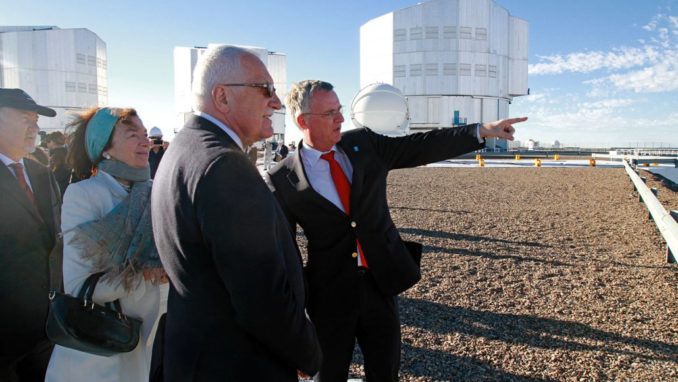
European Southern Observatory, CC BY 2.0, via Wikimedia Commons
This not the first time that Václav Klaus’ astute observations and experience-based predictions turn out to be shockingly accurate years later, and I’m pretty confident it will not be the last. Even before the examples that follow and that he clearly laid out in his address at the Marmara Forum, the former President of the Czech Republic has repeatedly proven to be quite prophetic in his assessment of the future.
From his critique and his warnings about the many vulnerabilities of our current monetary system and to his fierce opposition against central planning and State overreach, to the Covid crisis and the way it was handled by most nations, it is by now clear that his is one of the very few voices that truly stand out from the noise. For years, he’s been warning of the very real dangers of reckless spending and printing and of huge budget deficits and extreme public debt levels. And unfortunately for all of us, he was correct and now we reap what policymakers have sown for decades.
In this latest example, we can see how he was among the first to deeply understand the geopolitical and economic dynamic of the region and how he saw the Ukraine-Russia conflict coming years ago. To be precise, he did not only foresee the present crisis, but he also identified the severe threats that it would pose to the West and to the entire world.
While it is of course important to once again note his track record on “reading the tea leaves” and on drawing consistently accurate conclusions from his decades long experience and political acumen, in my personal view, it is essential to pause and to reflect on his call to action towards today’s leadership, especially in the international community: “A solution can’t be based on prolonging the war into infinity or till the total destruction of either Russia or Ukraine.” For it is clear, that the total destruction of either of the adversaries will not stop with them, but it will take the West, as we know it, down with it as well.
Marmara Forum and Today’s World Crisis*
Václav Klaus
It is great to be in Istanbul after so many years, to be here after two years of mainly virtual contacts and to be here without masks. Many thanks to Prof. Suver and his colleagues and collaborators for making the meeting possible and for bringing us here. It is refreshing to get a chance to meet many good old friends here.
The times they are a-changin’, as Bob Dylan sang almost sixty years ago. I was here last time in April 2015, seven years ago. The world was different then in many aspects:
- It was still at the very beginning of a new wave of mass migration, which has radically changed Europe and the atmosphere in the European Union. As a transit country, Turkey became unintentionally a significant part of it. This crisis raised serious questions about the EU’s commitment to a world without borders, as well as about the meaning of multiculturalism and of the nation-state.
- It was before Brexit and its attack on the a priori postulated non-disputable benefits of the “ever-closer union” of politically and economically heterogeneous countries.
- It was before Trump and his attack on the progressivist ideology in the United States and elsewhere.
- It was before Covid and the way it exposed the undeserved and unsustainable easiness of life (in Milan Kundera’s terms “the unbearable lightness of being”) in the modern era. To be specific, the fundamental change was not caused by Covid itself, but by what I call covidism. This is the term by which I describe the reaction of politicians, political activists and bureaucrats in international organizations to the SARS-Cov-2 pandemic.
- Finally, it was before the Ukraine war and its devastating impact not only on Ukraine, but also – and not less – on Russia and on many countries in the vicinity. The Czech Republic is a typical example.
Seven years ago, when I spoke here last time, I said that “we are facing the destabilization of Ukraine”. I felt already at that time that “we are endangered by the Ukraine crisis”. I was convinced that “the crisis was home-made and was caused by the failure of Ukraine to successfully realize the necessary post-communist political, economic and social transformation”. I said also that “the Ukraine domestic problems were misused for starting a new wave of confrontation between the West and Russia.” This was in April 2015. We should not pretend that the problem there started in February 2022. As these quotes of mine prove, some of us saw the situation there as extremely risky and hazardous long time ago.
It was adequate to use the term “confrontation” in April 2015. It is, regretfully, necessary to say “war” now. It is a tragic and destructive war. It kills tens of thousands of people. It brings huge material and financial costs. It liquidates the post-WW2 global arrangements. It changes the atmosphere in the whole world. Today’s aggressor is Russia, there are no doubts about it.
However, that is not all. The very fertile ground for a tragic clash has been under construction for a long time and the rest of the world has been involved in it in many respects. It is too early, especially in our part of the world, to discuss it strictly analytically, without emotions and aprioristic presumptions.
The solution will not come from the two fighting countries only. It is the task of the international community to help to stop the war, to take an active part in the preparation of very difficult negotiations, to help to draft at least the outlines of a feasible solution. Such a solution can’t be based on prolonging the war into infinity or till the total destruction of either Russia or Ukraine.
I have neither the ambition nor the political position to suggest the framework of negotiations and basic aspects of an agreement that could bring a solution, but I am convinced that the serious and meaningful negotiations have to start now. It was too late yesterday. To find a solution to this tragic and horrifying war is a precondition for solving other important global, as well as regional issues discussed at this year’s Marmara Forum.
We, in the Czech Republic and in the whole of Central Europe, are confronted with galloping inflation (luckily not as high as in Turkey), with huge budget deficits and growing indebtedness, with collapsing energy deliveries, with declining living standards and with a grim prospect of an upcoming recession. Our governments are not strong enough neither politically, nor in their ability to act decisively, consistently and systematically. To our great regret, we can’t expect from them quick and adequate political responses. Saying that is not just empty pessimism on my side. It is a sad conclusion of an old, not necessarily “sagacious”, but still analytically minded man.
Many thanks for giving me the floor for sharing some of my thoughts with such a distinguished audience.
* 25th Eurasian Economic Summit, Istanbul, June 9, 2022
This article has been published in the Newsroom of pro aurum, the leading precious metals company in Europe with an independent subsidiary in Switzerland.
This work is licensed under a Creative Commons Attribution 4.0 International License.



